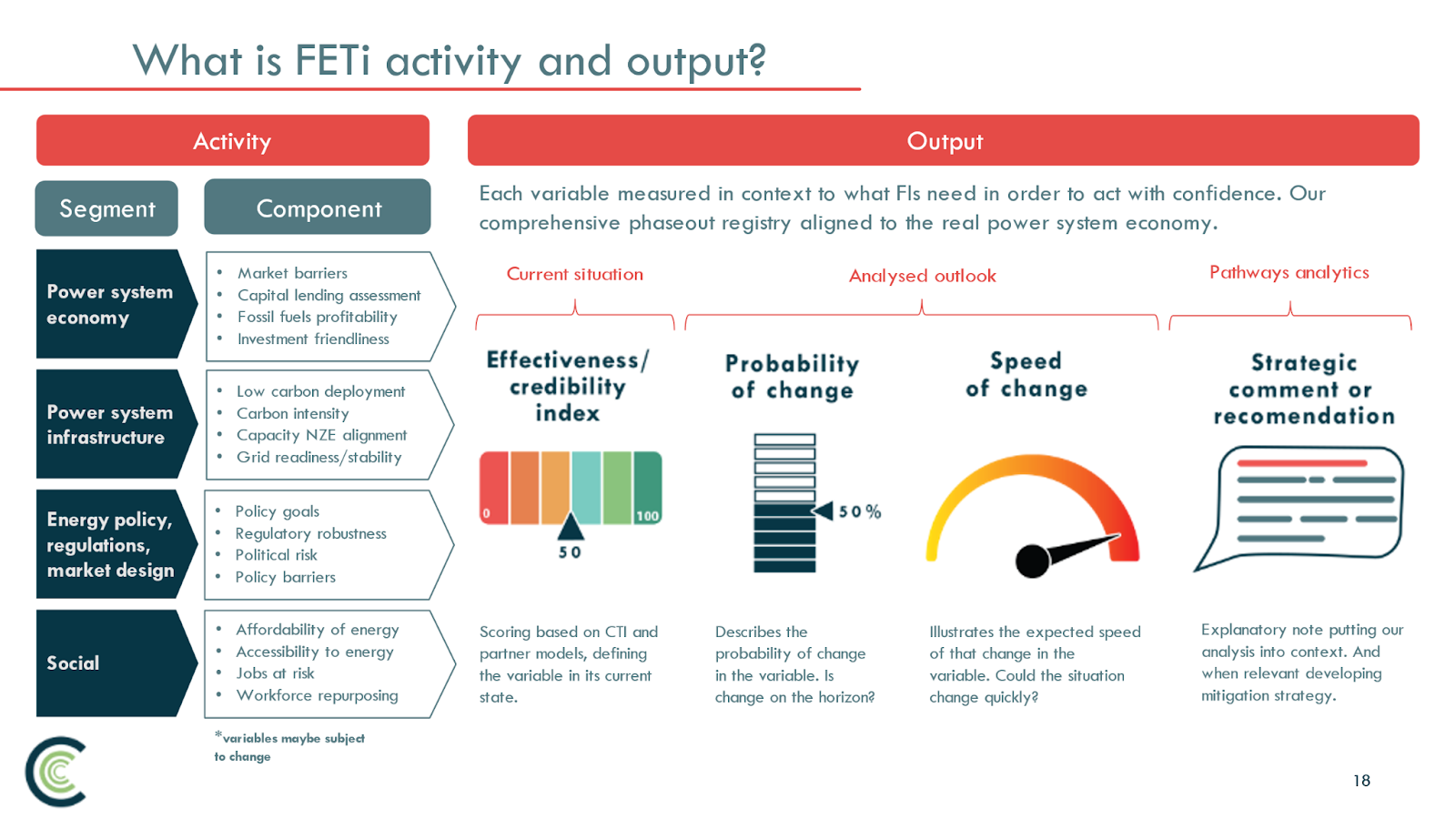This year, the British think tank Carbon Tracker plans to launch a global energy data portal and new ratings and indicators tool for policy makers, financials and industry—the Financial Energy Transition index (FETi). FETi is designed to track and measure the credibility of country-specific energy transition actions and plans. It will create actionable indicators and set standards to forward the energy transition, particularly for economies stuck in transition. And it will identify decarbonisation stumbling blocks and point at transition pathways based on a pragmatic “circular phaseout”. Essentially, the tool is designed to examine the alignment of capital energy investments with the goals of the green transition, provide recommendations for legislative changes, and help build reliable energy markets. It is expected that FETi will serve as a valuable resource for international investors, offering insights into the transparency, sustainability, and predictability of energy systems in different countries when making financing decisions. Will Ukraine be featured on this portal, and what rating will it receive?
"Power grids are not driven solely by economics, so we need an approach that accounts for infrastructure, political, system, and social dimensions too. To assess the need and readiness of a power system’s journey to net zero, FETi focuses on four key areas which financials must have transparency and predictability on before they can act. We aim to create a comprehensive tool that evaluates energy system performance across: economic, technical, political, and social dimensions. These dimensions are crucial for effectively tracking and implementing the energy transition. By developing this tool, we can assess the reliability of countries' green transition plans, identify challenges, and provide recommendations to overcome them. This is essential for mobilizing private capital in international markets, particularly in developing countries (EM&DEs), with the support of initiatives like GFANZ (Glasgow Financial Alliance for Net Zero) led by the private and public-private sectors. We eagerly anticipate Ukraine's inclusion in this ranking to increase its visibility to international investors," says Christopher de Vere Walker, Head of Power and Utilities at Carbon Tracker.
The Financial Energy Transition Index (FETi) is expected to consist of four components: power system economics and power system infrastructure, analysis of energy legislation, and addressing social protection concerns. The first segment focuses on investment attractiveness, market barriers, fossil fuel subsidies, and capital investment lending mechanisms. The engineering aspect examines the carbon capacity of the sector and the technical feasibility of deploying renewable energy sources in line with the state of distribution networks. The legislative component examines the regulatory environment and political risks, while the social protection segment assesses electricity accessibility, price affordability for the population, and the nature and scope of job transitions required for the green transition.

Analyzing these factors will provide stakeholders with a comprehensive understanding of the effectiveness of existing energy transition policies in each country. It will also provide insights into the potential for policy changes and the necessary timeframes for implementation, offering specific recommendations for achieving sustainable outcomes.
"This year, the Ukrainian government approved the Energy Strategy until 2050; however, it remains undisclosed to the public. This document will serve as the primary blueprint for Ukraine's rebuilding efforts. Nevertheless, certain excerpts shared by the Ministry of Energy with international partners have raised concerns, particularly regarding plans to increase oil and gas production. To attract investment for Ukraine's reconstruction, we must instill confidence in potential investors. This cannot be achieved without transparent data and realistic plans that align with the development of small-scale generation and distributed energy sources. It is crucial for international partners that the Energy Strategy 2050 at least meets the climate goals of the European Green Deal; otherwise, we will not witness significant investments. Therefore, we urge the authorities to engage with international investors and publish data that facilitates this process," says Svitlana Romanko, Director of Razom We Stand.
Carbon Tracker's project analysts assure that the FETi Index will serve as a guiding resource for potential investors, similar to existing tools in the financial domain (e.g., CDP). It aims to reduce uncertainty, complexity, and ambiguity of information when making decisions about financing renewable energy projects.

"According to the Law of Ukraine "On Access to Public Information," access restrictions apply to specific information within a document, rather than the entire document itself. In the case of the Energy Strategy 2050, if restricted information exists, unrestricted information should be made available for review. We have submitted an information request to the Ministry of Energy, which unfortunately has been ignored. Unfortunately, even before the war, Ukrainians faced limited access to information regarding utility pricing, including electricity, and the information provided by private distribution companies was often manipulated, leading to significant corruption risks. It is imperative to address these problems promptly if we intend to attract foreign capital. Achieving a favorable ranking in independent international assessments will undoubtedly facilitate this process," says Olha Yevstihnieieva, Green Rebuilding Advocacy Manager at Razom We Stand.
For reference:
Razom We Stand has emphasized the critical importance of accounting for greenhouse gas emissions and disclosing climate data in achieving climate goals and facilitating Ukraine's post-war recovery based on sustainable and environmentally friendly principles. These efforts are essential to ensure Ukraine's competitiveness in international markets. Unfortunately, we have yet to receive a response from the Vice Prime Minister, Minister of Digital Transformation of Ukraine Mykhailo Fedorov, and the Chair of the State Statistics Service of Ukraine Ihor Verner. Razom We Stand will continue engaging with government authorities to advocate for the disclosure of climate data.